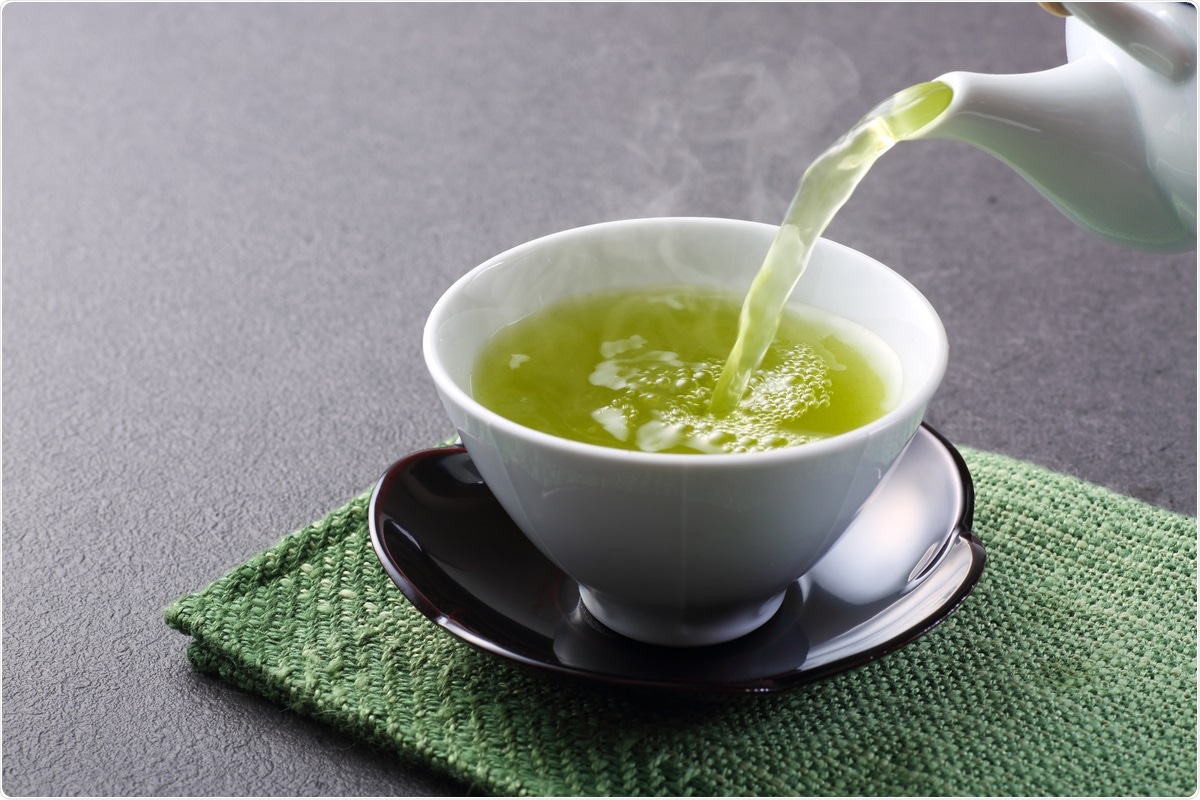A green tea compound shows anti-SARS-CoV-2 properties in vitro (original) (raw)
Adding to its long list of health benefits, new research finds antiviral activity from green tea. In a new study, one of its ingredients, epigallocatechin gallate (EGCG), blocked severe acute respiratory syndrome coronavirus 2 (SARS-CoV-2) from binding to human angiotensin-converting enzyme 2 (ACE2) receptors and can subsequently prevent infection of human lung cells. This action was also observed in the SARS-CoV-2 variants of concern (VOC).
Green tea is one of the most consumed beverages in many countries across Asia. It has high anti-inflammatory and anti-oxidative properties that could help reduce the risk of developing severe COVID-19 symptoms.


 This news article was a review of a preliminary scientific report that had not undergone peer-review at the time of publication. Since its initial publication, the scientific report has now been peer reviewed and accepted for publication in a Scientific Journal. Links to the preliminary and peer-reviewed reports are available in the Sources section at the bottom of this article. View Sources
This news article was a review of a preliminary scientific report that had not undergone peer-review at the time of publication. Since its initial publication, the scientific report has now been peer reviewed and accepted for publication in a Scientific Journal. Links to the preliminary and peer-reviewed reports are available in the Sources section at the bottom of this article. View Sources
The researchers wrote:
Taken together, our data as well as the findings just reported by others[48-50] indicate the possibility that consumption of green tea or its active ingredient EGCG is beneficial for preventing or reducing SARS-CoV-2 transmission and infection…Given its low toxicity, antiinflammation, antioxidant, and anti-SARS-CoV-2 variant properties, use of GTB or EGCG is likely to minimize the SARS-CoV-2 spread, ameliorate symptoms and disease severity.”
The study “Epigallocatechin Gallate from Green Tea Effectively Blocks Infection of SARS-CoV-2 and New Variants by Inhibiting Spike Binding to ACE2 Receptor” is available as a preprint on the bioRxiv* server, while the article undergoes peer review.
Designing the research study
The team created several pseudoviruses that contained S proteins with a single mutation (K417N, E484K, N501Y, D614G) or with full-set mutations of the newly emerged variants (B.1.1.7, B.1.351, and B.1.429). They transfected the pseudoviruses into HEK293T-hACE2 cells. The wild-type S or D614G S was able to cause infection as observed by increased luciferase activity. Although, convalescent plasma of COVID-19 patients was successful in blocking both of these pseudoviruses.
The transfected cells showed little cytotoxicity to green tea beverages, indicating it was safe to use.
Viral inhibition caused by a green tea beverage
Green tea effectively prevented infection from the wild-type SARS-CoV-2 or D614G and the COVID-19 variants B.1.429 found in California and B.1.351 found in South Africa — in a dose-dependent manner. Researchers also found green tea beverages prevented other coronaviruses' infection as observed when tested against HCoV OC43 in HCT-8 cells.
Related Stories
- Extended Paxlovid courses show mixed results for long COVID symptoms
- Azvudine beats paxlovid in reducing COVID-19 deaths
- Tofacitinib reduces SARS-CoV-2 infection risk in patients with PTPN2 deficiency
The researchers next looked to see what was in green tea that was causing these antiviral effects. Catechins — EGCG, EGC, ECG, and EC — were studied because they are green tea’s active ingredients.
The results showed three catechins: EGCG, EGC, and ECG, dose-dependently blocked a pseudovirus infection caused by the wild-type SARS-CoV-2 strain.
Upon closer inspection, the researchers deduced EGCG as the most potent inhibitor for viral infection. EGCG makes up more than 50% of catechins found in green tea beverages.
In addition, exposing EGCG to mutated strains such as D614G, K417N, E484K, and N501Y suppressed its ability to cause infection.
The researchers also found EGCG inhibited viral infection of cells containing variants of concern, including B.1.17, B.1.351, and B.1.429.
EGCG was tested on infected human lung epithelial cells, where they discovered it could suppress SARS-CoV-2 before and after infection. Although, the inhibitory activity was greater when cells were pretreated with EGCG before SARS-CoV-2 infection.
Catechin’s antiviral activity was also effective in preventing infection from other related coronaviruses. EGCG was the most effective in suppressing HCoV OC43, while EC was the least effective.
EGCG prevents inhibition by blocking SARS-CoV-2 binding to ACE2 receptor
EGCG was most effective in stopping the viral entry of SARS-CoV-2 in human cells before infection — although it was also somewhat effective during infection.
The researchers found it blocked viral entry by preventing the S1 subunit — which has the highest binding affinity — to ACE2. EGCG also decreased binding of the S2 subunit, although it already had a little binding affinity to ACE2.
The researchers concluded:
We found that the recombinant RBD could bind to ACE2 with EC50 of 4.08 ng/mL, while EGCG significantly decreased the binding affinity of RBD (4.7-fold) with EC50 of 19.19 ng/mL. In addition, EGCG also diminished the binding affinity of full-length S to ACE2 by 2.5-fold (EC50: 43.48 to 107.6 ng/mL). The inhibitory effect of EGCG on RBD or full-length S binding to ACE2 was dose-dependent.”

 This news article was a review of a preliminary scientific report that had not undergone peer-review at the time of publication. Since its initial publication, the scientific report has now been peer reviewed and accepted for publication in a Scientific Journal. Links to the preliminary and peer-reviewed reports are available in the Sources section at the bottom of this article. View Sources
This news article was a review of a preliminary scientific report that had not undergone peer-review at the time of publication. Since its initial publication, the scientific report has now been peer reviewed and accepted for publication in a Scientific Journal. Links to the preliminary and peer-reviewed reports are available in the Sources section at the bottom of this article. View Sources
Journal references:
- **Preliminary scientific report.**Liu J, et al. Epigallocatechin Gallate from Green Tea Effectively Blocks Infection of SARS-CoV-2 and New Variants by Inhibiting Spike Binding to ACE2 Receptor. bioRxiv, 2021. doi: https://doi.org/10.1101/2021.03.17.435637, https://www.biorxiv.org/content/10.1101/2021.03.17.435637v1
- **Peer reviewed and published scientific report.**Liu, Jinbiao, Brittany H. Bodnar, Fengzhen Meng, Adil I. Khan, Xu Wang, Sami Saribas, Tao Wang, et al. 2021. “Epigallocatechin Gallate from Green Tea Effectively Blocks Infection of SARS-CoV-2 and New Variants by Inhibiting Spike Binding to ACE2 Receptor.” Cell & Bioscience 11 (1). https://doi.org/10.1186/s13578-021-00680-8. https://cellandbioscience.biomedcentral.com/articles/10.1186/s13578-021-00680-8.
Article Revisions
- Apr 6 2023 - The preprint preliminary research paper that this article was based upon was accepted for publication in a peer-reviewed Scientific Journal. This article was edited accordingly to include a link to the final peer-reviewed paper, now shown in the sources section.
Posted in: Medical Science News | Medical Research News | Disease/Infection News | Healthcare News
Tags: ACE2, Angiotensin, Angiotensin-Converting Enzyme 2, Anti-Inflammatory, Antioxidant, Antiviral Drug, binding affinity, Compound, Convalescent Plasma, Coronavirus, Coronavirus Disease COVID-19, covid-19, Cytotoxicity, Enzyme, Green Tea, in vitro, Luciferase, Mutation, Pseudovirus, Receptor, Research, Respiratory, SARS, SARS-CoV-2, Severe Acute Respiratory, Severe Acute Respiratory Syndrome, Syndrome, Tea

Written by
Jocelyn Solis-Moreira
Jocelyn Solis-Moreira graduated with a Bachelor's in Integrative Neuroscience, where she then pursued graduate research looking at the long-term effects of adolescent binge drinking on the brain's neurochemistry in adulthood.
Citations
Please use one of the following formats to cite this article in your essay, paper or report:
- APA
Solis-Moreira, Jocelyn. (2023, April 06). A green tea compound shows anti-SARS-CoV-2 properties in vitro. News-Medical. Retrieved on January 23, 2025 from https://www.news-medical.net/news/20210322/A-green-tea-compound-shows-anti-SARS-CoV-2-properties-in-vitro.aspx. - MLA
Solis-Moreira, Jocelyn. "A green tea compound shows anti-SARS-CoV-2 properties in vitro". News-Medical. 23 January 2025. https://www.news-medical.net/news/20210322/A-green-tea-compound-shows-anti-SARS-CoV-2-properties-in-vitro.aspx. - Chicago
Solis-Moreira, Jocelyn. "A green tea compound shows anti-SARS-CoV-2 properties in vitro". News-Medical. https://www.news-medical.net/news/20210322/A-green-tea-compound-shows-anti-SARS-CoV-2-properties-in-vitro.aspx. (accessed January 23, 2025). - Harvard
Solis-Moreira, Jocelyn. 2023. A green tea compound shows anti-SARS-CoV-2 properties in vitro. News-Medical, viewed 23 January 2025, https://www.news-medical.net/news/20210322/A-green-tea-compound-shows-anti-SARS-CoV-2-properties-in-vitro.aspx.







